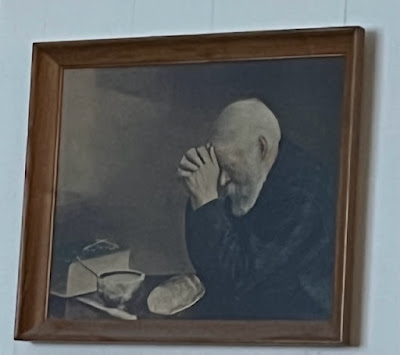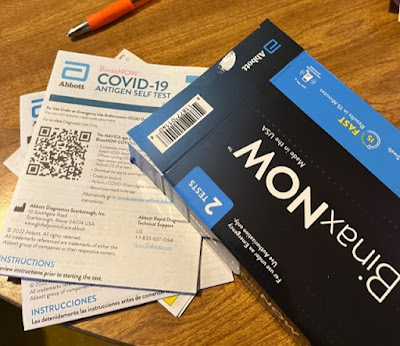Poet...Musician...Thinker...Blogger...Teacher...Husband...Father...I'm not perfect, but I try!
Tuesday, January 31, 2023
January 31: "The Poetry Teacher," Wisdom from My Dog, Nap
Monday, January 30, 2023
January 30: "Her Grave," Eulogize and Memorialize, Helen Pentecost
ꟷ
ꟷ
Her wolfish, invitational, half-pounce.
Her great and lordly satisfaction at having chased something.
My great and lordly satisfaction at her splash
of happiness as she charged
through the pitch pines swiping my face with her
wild, slightly mossy tongue.
ꟷ
Does the hummingbird think he himself invented his crimson throat?
He is wiser than that, I think.
A dog lives fifteen years, if you're lucky.
Do the cranes crying out in the high clouds
think it is all their own music?
A dog comes to you and lives with you in your own house, but you
do not therefore own her, as you do not own the rain, or the
trees, or the laws which pertain to them.
Does the bear wandering in the autumn up the side of the hill
think all by herself she has imagined the refuge and the refreshment
of her long slumber?
A dog can never tell you what she knows from the
smells of the world, but you know, watching her, that you know
almost nothing.
Does the water snake with his backbone of diamonds think
the black tunnel on the bank of the pond is a palace
of his making?
ꟷ
She roved ahead of me through the fields, yet would come back, or
wait for me, or be somewhere.
Now she is buried under the pines.
Nor will I argue it, or pray for anything but modesty, and
not to be angry.
Through the trees there is the sound of the wind, palavering.
The smell of the pine needles, what is it but a taste
of the infallible energies?
How strong was her dark body!
How apt is her grave place.
How beautiful is her unshakeable sleep.
ꟷ
Finally,
the slick mountains of love break
over us.
This is how anyone recovers from loss. Slowly. Second by second. Hour by hour. Day by day.
I always find funerals strange affairs. For a little while, everyone gathers to pray and eulogize and memorialize. Then everybody goes to another place (usually) to eat and visit and laugh. I find that transition from sorrow to fellowship jarring. But perhaps that's the way it should be. Like a drink of ice cold water after being in the desert for a week or so. It's a turning back to life.
So many times, living in the Upper Peninsula of Michigan, the change from winter to spring is very sudden. Not a slow melting over days or weeks. It can happen overnight. I've gone to bed, layered under quilts and blankets, and woken up into a morning where the sun is shining and birds are singing in the pines. It's a beautiful shock to the system.
Tonight, I hosted a book launch event at the library where I work. The book was a manuscript written by my friend, Helen. A collection of poems she'd been working on for over a year, right up until the last weeks of her life last August. After she died, I worked with another poet friend to usher those 39 poems into book form.
The event tonight was packed with Helen's friends and admirers. People who've been missing her terribly these past six months. There were tears shed. Lots of hugs exchanged. But the overall emotion I felt in the room was joy. It was a celebration, and, with each poem that was read and story shared, Helen was there with us. Her breath, captured on the page, blew around us like some kind of Helen Pentecost, anointing each person, blessing us all.
I had expected to feel Helen's absence a lot tonight. Instead, I felt her presence, pushing us, willing us to embrace the wonder that is this world. That's what Helen did each and every day she lived.
Saint Marty is wonder-filled tonight.
Sunday, January 29, 2023
January 29: "Bazougey," Joy, Forever Gifts
Saturday, January 28, 2023
January 28: "The Dog Has Run Off Again," Obedience, Shoulds
Friday, January 27, 2023
January 27: "Benjamin, Who Came from Who Knows Where," Scar of Orange, Sunrise
Thursday, January 26, 2023
January 26: "Percy (Nine)," Examined Life, Overdid It
Percy (Nine)
by: Mary Oliver
Wednesday, January 25, 2023
January 25: "Little Dog's Rhapsody in the Night (Percy Three)," COVID Quarantine, Sweet Arrangement
Tuesday, January 24, 2023
January 24: "Percy (One)," Simple Things, Still Positive
Monday, January 23, 2023
January 23: "The Storm," Snow Puppy, Everything Wondrous
Sunday, January 22, 2023
January 22: "What Gorgeous Thing," Couch Day, Grace
Saturday, January 21, 2023
January 21: "The Vulture's Wings," Day Two, Icicles
Friday, January 20, 2023
January 20: "Blueberries," Nostalgia, COVID-Positive
Thursday, January 19, 2023
January 19: "Drifting," 'Sup?, Holiness
Wednesday, January 18, 2023
January 18: "Do Stones Feel?", Sister Starling, Interdependent
Tuesday, January 17, 2023
January 17: "Loneliness," Ugly Duckling, Inner Critic
Monday, January 16, 2023
January 16: "On Meditating, Sort Of," Failures, Dreams
Sunday, January 15, 2023
January 15: "Franz Marc's Blue Horses," Helen's Birthday, Piece of God
Saturday, January 14, 2023
January 14: "Stebbin's Gulch," Ordinary Saturday, Beauty
Mary Oliver, beauty, and perfection . . .
Stebbin's Gulch
by: Mary Oliver
by the randomness.jpg)


















